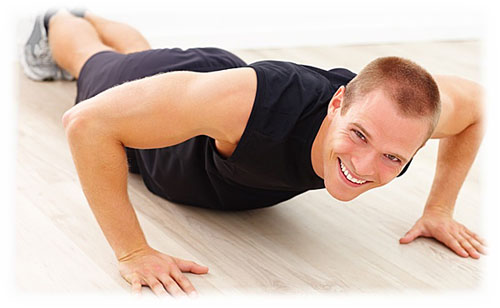Everyone goes through a depressing phase. Exercise might be the last thing on your mind during that time. But it is a known fact that exercise can make a huge difference. Exercise is known to lift up your mood and lower your depression levels. Sometimes, it is also used to treat mild or moderate depression.
 Exercise plays a huge part in preventing and recovering a number of health issues like diabetes, arthritis, blood pressure problem etc. It is also known to help anxiety and depression and improve your mood and put you in a positive frame of mind.
Exercise plays a huge part in preventing and recovering a number of health issues like diabetes, arthritis, blood pressure problem etc. It is also known to help anxiety and depression and improve your mood and put you in a positive frame of mind.
Benefits Of Exercising:
• Increased self esteem and pride
• Being Stress free
• Cheerfulness and no signs of depression
• Sound sleep
• Health wise there is a considerable increase in strength
• Controlled blood pressure
• Helps reduce extra weight
• Improves heart functions
• Makes you feel energetic
• Makes you have a better self confidence
• Increase in body temperature which calms you down.
• Increases your immunity
• May also help you socialising and meet other people.
 There have known to be certain types of exercises to help fight with depression which doctors commonly recommend:
There have known to be certain types of exercises to help fight with depression which doctors commonly recommend:
• Biking
• Swimming
• Household chores
• Jogging
• Yoga
• Gardening
• Tennis
• Dancing
Joining a group dance class or a group yoga class also helps fight with depression as there is a strong (unseen) psychological support you get from the other members or partners from the group. Another good way is to take your spouse or you friend along which will make you feel emotionally supported and you will be at peace that someone is there with you or for you in your hard times.
Heart patients or people with bone problems and people aged beyond 50 should, however, should take advice from their doctor before starting any of the activities.
The duration for which you should exercise is anywhere between 30 mins to an hour per day and at least 3-4 times a week. If you are a beginner you should gradually increase your time so you don’t over burden your body with sudden exercise.
A well planned routine is always the key to having a good exercise regime. You have to study what time suits you the most according to your daily activities. Once you start your regime, then you can adjust your timings and schedules and/or exercise timings accordingly.
The numero Uno way to go is to choose something that you enjoy and you are comfortable with. To be on time and regular always put a reminder in your phone or put it down on a calendar that you are bound to see or notice every day. Another thing you can do to not make your activity monotonous and boring is to vary your exercises routines. Trying something different also might help.
Avoid the strain on your pocket by joining expensive gymnasiums or health clubs unless you are certain that you will go regularly. Don’t leave it half way. Continue with your schedules and your exercise regime until it becomes a part of you.
If you happen to have frequent pains after a workout do not hastate to go to your doctor and get it checked. What that will do is, you will know to tone down certain exercises which may not be suitable for your body type and also the doctor will suggest you different exercises to strengthen the weak parts of your body.
While many use the rigorous physical way of exercise to reduce depression, a large number of people also adopt to holistic healing like meditation or The Art of Living or massage therapies. Studies and surveys have shown that these methods also turn out to be helpful to fight depression for people who don’t usually like strenuous activities. These exercises get your body and mind at peace and help you remain calm in stressful situations.
All in all, being depressed is not something that we can’t get rid of. A little bit of exercise or meditation or swimming or jogging will always make u more cheerful and help you have a positive outlook towards life.


 Cart : 0 items - $0.00
Cart : 0 items - $0.00










